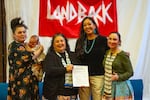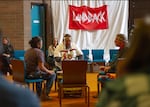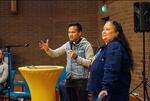
Future Generations Collaborative members hold a freshly signed ownership agreement for the former Presbyterian Church of Laurelhurst on March 15, 2024. Left to right: Jennifer Pertile, her five-month-old son Gray, Jillene Joseph, Natalyn Begay and Chenoa Landry.
Jarrette Werk / Underscore News / Report for America
This story originally appeared on Underscore.news.
Dozens of Indigenous elders, youth and church members filed into the former Presbyterian Church of Laurelhurst on a March afternoon. It was the last time people would enter the building as a church. As they passed an abalone shell filled with smoldering sage, each person picked up a penny from a small bowl.
Inside, attendees placed their pennies on a red cloth. Next to the cloth was a stack of papers. Once signed, they would finalize the transfer of the church to Future Generations Collaborative (FGC), an Indigenous-led organization founded to prevent fetal alcohol syndrome disorder.
On Friday, March 15, ownership of the former Presbyterian Church of Laurelhurst was officially transferred to FGC in exchange for $1, marking its historic return to Native hands for the creation of Barbie’s Village — a tiny home village and early childhood center for Indigenous families experiencing homelessness.
“Everybody took a penny or two when you came into this room,” Jillene Joseph, Aaniiih citizen, engagement lead for Future Generations Collaborative and executive director of Native Wellness Institute, said to the people sitting in a circle. “There’s 100 of them because 100 pennies equals $1, and that’s what we’re buying this for, is $1.”

Over six dozen people attended the transfer of ownership event held on March 15, 2024. Each person placed a penny or two on a red prayer cloth until they added up to 100, or $1, the symbolic price of the former Presbyterian Church of Laurelhurst.
Jarrette Werk / Underscore News / Report for America
After eating, folks funneled into the sanctuary room that will one day be transformed to resemble the inside of a traditional long house. They sat in a circle and listened as friends and family shared memories of Barbie Jackson Shields (Atwai), the person who inspired the project, and its namesake.
“[It] was a historic event, because after over three years of meetings, building relationships, building trust, and proving ourselves over, and over, and over to different levels of the church, the church finally gifted the land back, or ‘Land Back’ as we call it,” Joseph said.
Land Back years in the making
Since 2012, FGC has sought to support the health and healing of the urban Native community in Portland.
Barbie’s Village has been a dream in the works for more than three years now, named after and honoring the legacy of Barbie Jackson Shields (Atwai), a citizen of the Confederated Tribes of the Warm Springs, and an original Natural Helper — a role central to the mission of the FGC. Shields was dedicated to addressing public health disparities among Indigenous communities, particularly those experiencing homelessness on their homelands.

Kenny Shields, center, is the husband of the late Barbie Shields. With his help, Future Generations Collaborative brainstormed the idea of creating Barbie's Village as a way to honor her legacy.
Jarrette Werk / Underscore News / Report for America
Barbie’s husband, Kenny Shields, Anishinaabe and Sioux, said that this moment was important to him and his family. He was joined by two of their daughters, Tacori, 10, and Ashah, 8, who proudly wore their yellow and blue fancy shawls.
“To be able to sit back and witness the signing of this process after years of delegation has been meaningful to me,” Kenny said.
Shields said he and his wife had often dreamt about creating a safe place for Native families who, like them, had small children and needed a place to turn to when struggling to secure safe and affordable housing.
In 2018, Barbie suffered a brain aneurysm that took her life before she could see that dream come true. To honor her dream and legacy, Joseph told Shields that she wanted to name the project after his late wife.
The decision to gift the land and property to FGC came after a vote last fall by Presbytery of the Cascades, the regional governing body for over 90 congregations in Oregon and Washington state. Members voted 135 to 24 to gift the land and building of the former Presbyterian Church of Laurelhurst to Future Generations Collaborative for $1.
Now, Joseph says, FGC will begin to transform the former church into Barbie’s Village — a tiny home village with six to 10 tiny homes and a resource center to provide wrap-around services for Indigenous families experiencing housing insecurity and homelessness.
“We are very grateful for this gift,” Joseph said. “We understand how big this gift is and we accept it full of love, honor, care and respect.”

In this file photo taken on Oct. 30, 2023, Rev. Chris Dela Cruz serves as head of the Barbie’s Village Task Force, where he and members took on the responsibility of knocking door-to-door to answer questions, as well as inform and educate the community members living in the neighborhood near where Barbie’s Village will soon be built.
Jarrette Werk / Underscore News / Report for America
Allyship and healing
Getting to this point was not easy. It required years of establishing trust, allyship and relationship building, and most of all, the healing of generational wounds and trauma at the hands of the church.
Three years ago, The Barbie’s Village Task Force was created. Under the leadership of Rev. Chris Dela Cruz, Future Generations Collaborative, Leaven Community Land and Housing Coalition and the Westminster Presbyterian Church worked together to address homelessness and fulfill the need within the community, while simultaneously returning the land to Indigenous stewardship and providing opportunity for the church to begin the path to repatriation and reconciliation.
“This is the first time I’ve ever experienced an ally standing up for me,” Joseph said. “That was just like a really profound awareness for me, and it just made me that much more grateful for everything that we’re doing.”
Members of the Barbie’s Village Task Force took on the responsibility of knocking door-to-door to answer questions, as well as inform and educate community members living in the neighborhood that Barbie’s Village would soon be a reality.
This is work that Rev. Dela Cruz said is “incredibly personal” as a Filipino American who “puts on a collar that bears the weight of the saints and sins of the Church.”Dela Cruz shared how his ancestors had land taken over by both European and American powers in collusion with the Church, which resulted with many aspects of Filipino Indigenous culture and peoples being systematically erased because of colonization.
“This act of Land Back is but a drop in the bucket in the need for the American Church, and indeed, my own Presbytery, to reckon with its own complicitness in white supremacy and do the work of repair with the Indigenous community,” said Rev. Dela Cruz during his speech on March 15. “But in truth, Barbie’s Village is a gift to us, the church, for it allowed us to make a concrete real act of repair that must be a model for the church to continue to pursue if we are to be true of our calling.”
“Today, Indigenous peoples will claim this as their land once again, to steward for the good of all,” Rev. Dela Cruz added.

Every attendee went home with braids of sweet grass as a way to say thank you for showing up and supporting Barbie’s Village. “We're gifting you one of my favorite traditional medicines, the sweet grass,” said Jillene Joseph. “We're gifting this to you so when you look at this, or hold it, or pray with it, or smudge with it, that your prayers will also continue to include Barbie's Village.”
Jarrette Werk / Underscore News / Report for America
What’s Next
Last fall, Multnomah County Chair Jessica Vega Pederson announced an emergency measure to get money into the hands of the nonprofits working to address homelessness. A portion of that package included an initial $300,000 grant to assist with startup costs associated with Barbie’s Village.
Joseph says FGC is applying for additional grants to help cover construction of six to 10 tiny homes with indoor plumbing and heating, as well as outdoor child playscapes. Joseph said she hopes to hire multiple contractors simultaneously, to speed construction and renovations to the existing building.
“It also depends on how far the money will go,” Joseph said. “We have the initial $300,000, and then we just wrote an almost $2 million grant to the Portland Clean Energy Fund that will likely do everything we need. So we’re starting with what we have funding for and then we’ll go from there.”

During the event on March 15, Jennifer Pertile shared memories of Barbie Shields. “The last time I saw Barbie and stayed with Barbie, she actually came and found me on the streets, because I was lost in my own addiction at the time,” Pertile said. “She just wanted to come and bring me home and take care of me. She had a way of really getting to you and letting you know that she cared and loved you and wanted something better for you.”
Jarrette Werk / Underscore News / Report for America
Strings attached
Although this is a historic Land Back achievement, there are still lingering doubts on the church’s end, according to Joseph.
“There was that reversionary clause in there, that said, if for some reason the FGC should fold, then the building would default and go back to the church,” Joseph said. “The church would decide what other Native nonprofit that it would go to.”
The agreement, put together by a separate task force under the larger regional church organization the Presbytery of the Cascades, states that the property will revert to the Presbytery of the Cascades if any of the following happens: FGC becomes insolvent, the property is no longer used for charitable purposes, the property is vacant for more than one month, FGC is no longer an active nonprofit corporation in good standing, or FGC sells or proposes to sell its assets or its interest in the property.
Joseph says the inclusion of such restrictions introduces doubt into an otherwise positive exchange. She said gift giving means not leaving strings attached.
“Part of our work is to heal ourselves from the lasting impacts of colonization and we know that the church has their healing work to do, too,” Joseph said. “We hope that the church does their healing work, so that the next time Land Back happens, it won’t be with the strings of oppression attached.”
Underscore is a nonprofit collaborative reporting team in Portland focused on investigative reporting and Indian Country coverage. It is supported by foundations, corporate sponsors and donor contributions. Follow Underscore on Facebook and X.